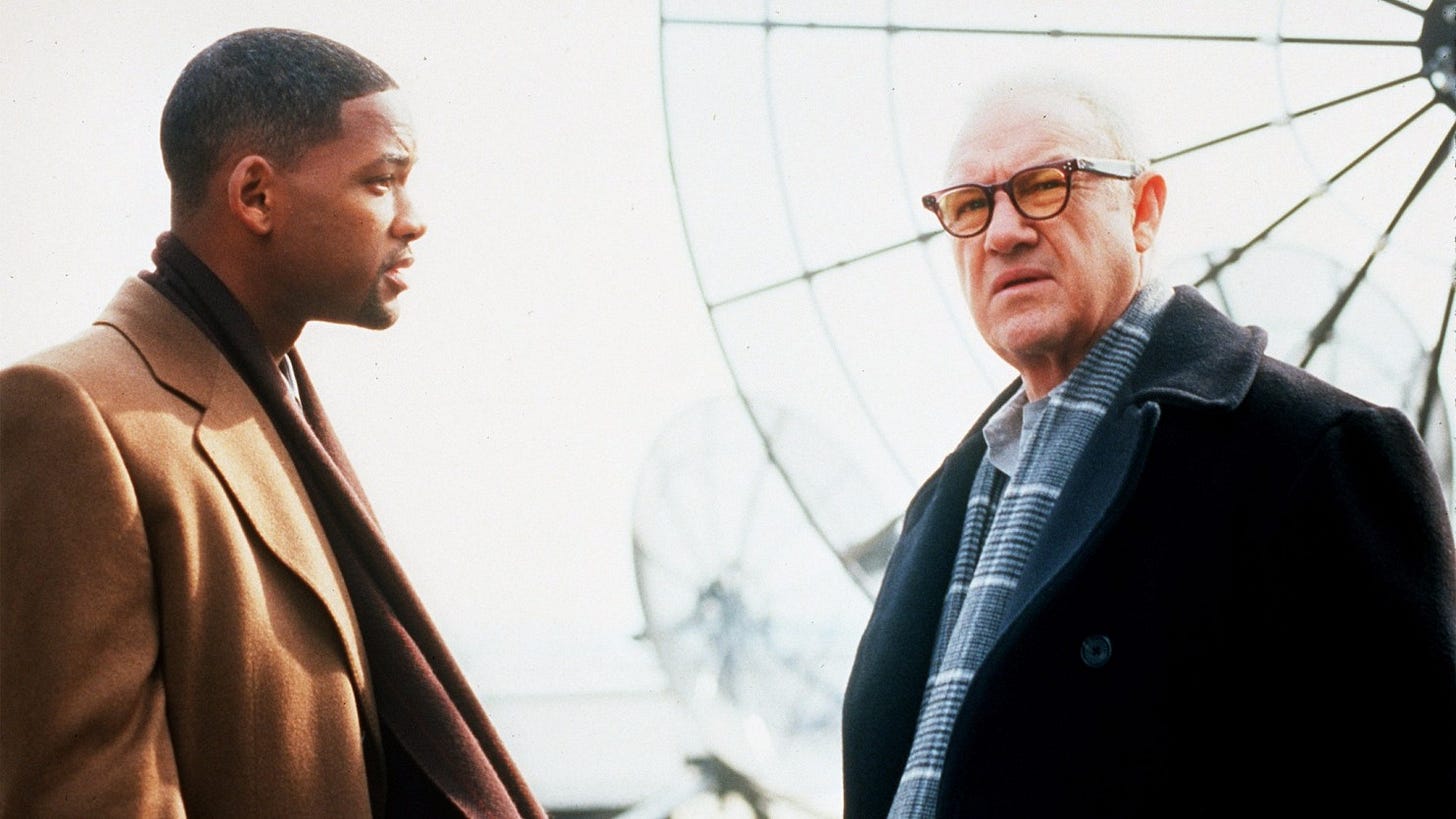Enemy of the State
Zoom in. Enhance.
Enemy of the State (1999) is a funny movie. Sometimes on purpose, sometimes by mistake, which will potentially be the legacy of many 90s Hollywood flicks, but at least this one is blatantly political in the best way: it’s here to tell you that technology is rapidly improving and the government can use it to fuck you up.
Everyman Robert Dean (Will Smith) is minding his own business, trying to find some lingerie to buy his wife, when an old buddy (played by Jason Lee!) deposits illicit intel in his shopping bag, making him, unwittingly, the target of evil government operator Thomas Brian (played aptly by real-life nut Jon Voight) and Brian’s henchman, notably among whom are Fiedler (Jack Black) and Selby (Seth Green).
Tony Scott made some of your favorite movies, I’m willing to bet: Top Gun (1986), True Romance (1993), The Last Boy Scout (1991), and my personal favorite: Unstoppable (2010). Nobody understood how to provide context for a scene in the most intense way possible like Tony Scott. Whether it’s trains screaming across a screen, planes screaming across a screen, or satellites screaming across a screen. (While spying on us.) Having done no research, I’m curious where this film ranks time-wise for using the “zoom in, enhance, flip it around” mechanic of how surveillance works. If this wasn’t the first, which it probably wasn’t, it’s undoubtedly one of the best and funniest.
Fast-paced action hijinks ensue, and Dean eventually encounters Brill (Gene Hackman), who seems to have some idea of what the hell is going on. Brill helps Dean dismantle many of the bugs being used to track him (the source of the action hijinks): one in the shoe, another in his jacket, etc. How does Brill know how to do this? Like Hackman’s Harry Caul from The Conversation (1974), Brill made the bugs. Not only did he make them, but there is more history to be discovered that feels like an intentional continuation of the character Harry Caul. There’s a fun case to be made, and many do make the case that Enemy of the State is a spiritual sequel to The Conversation, and I must agree. Some scenes are a clear homage to the previous wire-tapping film, such as when Robert Dean and Brill are walking around a park, having a, uh, conversation, filmed from a distance, with explicit audio references to the older film. Some scenes give us clues into “Brill’s” previous life when he worked for the government but regretted the impact of his work. And some scenes show us the sort of redemption we can count on from 90s action flicks: the hero wins, happiness is possible, and the system can be beaten every now and then. Enemy of the State is easy to look at as a silly, surface-level action film about the genuine threat of the surveillance state. But if The Conversation was a product of the 70s, communicating the hopelessness and misery of a path seemingly already walked down, then Enemy of the State is the spiritual sequel that shows no matter how far down a path you’ve walked, you can always turn and forge a new one.
Enemy of the State
Written by David Marconi; Directed by Tony Scott
1998
132 minutes
English
Recommended way to watch (at time of publication): Available on Hulu
Stray Thoughts from the Editor
Sequels! Hollywood loves ‘em. But Spiritual Sequels? Hollywood doesn’t care. But you should! Sometimes, a film gets so stuck in our collective craw that a sequel is inevitable, even if it’s from a completely different writer, director, film crew, and made in a completely different era. Artists are constantly in conversation with each other and themselves across the void, and this month we’ll look at some films that are continuations of those conversations.

